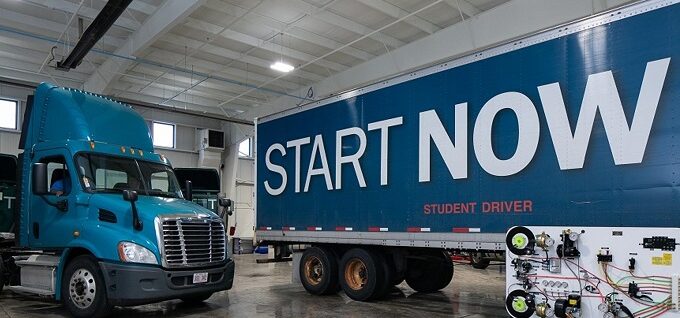In it for the long haul
By Erik Cassano
March 7, 2023
A national shortage of 80,000 truck drivers isn’t a small problem. From freight haulers to retail companies, delivery services to construction firms, businesses that rely on trucking face a constant battle to find and retain qualified drivers.
According to the American Trucking Association, the shortage could surpass 160,000 by 2030. That’s one of the reasons Cuyahoga Community College (Tri-C) has invested in its transportation and logistics programs at the Transportation Innovation Center (TIC) in Euclid.
As one of Northeast Ohio’s largest trainers of transportation professionals, the TIC is tasked with recruiting new workers to the industry and providing the training necessary to staff companies of varying needs and sizes. Businesses don’t grow without qualified transportation professionals, and those businesses rely on Tri-C to find and develop talent.
“It’s an ongoing challenge to recruit people to the industry,” said Ian Wilson, the center’s director. “We go into high schools to try and recruit young people, and we also search for students who might be a bit older and looking to change careers. There’s a demand for all ages and skill levels, and we try to address it all.”
Expanding their reach
More than 100 students train at the TIC each year. You can usually find some of them on the large concrete practice pad alongside the building or out on the road, perfecting turns, backing up and performing other maneuvers they’ll need to master so they can operate a big rig.
They come from many different walks of life, but they were all drawn to trucking for the freedom, the flexibility and the opportunity to earn a starting salary of up to $60,000 per year.
“I was in the Army about 20 years ago, and I missed being out in the world and seeing different things,” said Kenneth Starks, 42, of Cleveland Heights. “I was drawn to trucking because of the money, but also the chance to go across the country and see it.”
“The money is good, the benefits are good, and I like the idea of being my own boss,” said Ronnell Inge, 34, of Cleveland. “I’m aiming to get my own truck at some point.”
Students come to Tri-C’s TIC because of its reputation. Programs are taught by instructors who have spent decades in the transportation field, and no prior experience is required to begin classes.
“The program has great people and a great reputation in the community,” Inge said. “I’m trying to make this more of a passion than a job. You have to find your passion in life and do it well.”
To help more students pursue their passions, the TIC has steadily expanded its training offerings beyond tractor-trailer operation.
“We want to train anyone who is looking for a career in transportation and logistics,” Wilson said. “There’s so much need and so many opportunities out there. We really want to open those doors for our students.”
Trucks move more than just goods — they also move people. Bus companies are in the same position as cargo haulers, with a deficit of qualified operators. The TIC trains and tests drivers for private operators like Cleveland-based Barons Bus, and the center has a longstanding partnership with the Greater Cleveland Regional Transit Authority (RTA) as well. In October, that partnership received a major boost when RTA donated a pair of motor coaches to the TIC, greatly increasing the center’s training capacity for passenger vehicles. Only one bus had been available for training up to that point.
“We’ve been doing RTA training for about six years, and it’s a mutually beneficial relationship,” Wilson said. “RTA adds to our enrollment, and we support their recruitment.” Wilson notes that the TIC wants to act as a job hub for RTA, both in training and CDL testing.
“The fact that we offer on-site CDL testing is a big advantage for us. We can train on-site, but in the case of RTA, we might bring recruits in for their classwork, they’ll train at RTA’s facility, and then they’ll come back and test here. There’s built-in flexibility.”
Beyond the driver’s seat
The TIC’s reach extends out from behind the wheel.
Though the need for drivers is substantial throughout the transportation industry, there is also a need for qualified professionals to support those on the road. Behind the TIC’s offices, a pair of large indoor spaces house a warehouse training area and space for a planned diesel tech program.
The warehouse space, which serves the center’s warehouse and logistics program, simulates the activity in a large wholesale or retail warehouse, including a package conveyor and stock aisles of varying sizes, down which students maneuver a variety of forklifts to place and retrieve packages.
“Each warehouse poses its own set of challenges, so we’ve created an environment for our students to train in both tight spaces and larger spaces, with different gas and electric powered lifts,” Wilson said.
Once launched, the diesel tech program will allow Tri-C to train the mechanics who repair and maintain trucks and buses.
“If you need drivers, you also need qualified diesel techs,” Wilson said. “You can have the greatest drivers in the world, but they’re not going anywhere if the trucks aren’t in working order.”
Whether it’s outside on the pad, on the road, in the classroom or at any of the other teaching areas within the TIC, one thing remains certain: This is a place where students come to turn their dreams into a career.
“Trucking has become my passion,” said Raquel Williams, 41, of Shaker Heights. “The students and instructors at Tri-C have been very supportive in helping me reach my goal of being out on the road. I feel like the material is the same at just about any truck driving school, but the instructors here make all the difference.”
Williams said she feels especially motivated to take her Tri-C education and succeed as one of the relatively few female truckers on the road.
“The trucking industry doesn’t just need more female drivers, it needs more female owners — and I want to be one of them,” she said. “That’s why I came to Tri-C, and that’s the type of education and motivation I’m getting here.”
This article originally appeared in the Tri-C Times.



